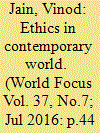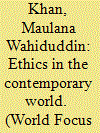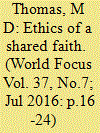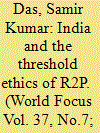| Srl | Item |
| 1 |
ID:
145907


|
|
|
|
|
| Summary/Abstract |
Ethics took shape in two different ways. One, in ancient times, when humans in order to understand environment started asking questions and kept trying to answer them by arguments and conjecture. This took them to what we now know as the religious path. In those earlier times religion suggested how human society began. At that time laws governing human behaviour were made in the name of God. At that time the concept of morality also went in the name of God. Two, in recent times, that is, during the last few hundred years, development of science based knowledge in a vast variety of fields developed a scientific world view. This world view was not based on opinions based on limited knowledge. This was based on knowledge that was huge, was verifiable and was expanding.
|
|
|
|
|
|
|
|
|
|
|
|
|
|
|
|
| 2 |
ID:
145890


|
|
|
|
|
| Summary/Abstract |
According to my study, all the religions have two different aspects to them – theology and the moral scheme. Theology means the set of beliefs or doctrinal base of a religion, in other words, the inner contents of a religion. In terms of theology, there are differences between religions. For example, some religions have the monistic concept of God, while other religions believe in the monotheistic concept of God. Differences of this kind have always been the subject of discussion among theologians and no doubt, they will continue to be so in the future. But like other intellectual discussions about differences, they are basically confined to scholars, having nothing to do with the common people. Common people can live their daily lives without concerning themselves with or even without knowing about these issues. These issues are concern of a few individuals and not of the masses of any society.
|
|
|
|
|
|
|
|
|
|
|
|
|
|
|
|
| 3 |
ID:
145892


|
|
|
|
|
| Summary/Abstract |
Taking into consideration the lives of human beings, what is the raison de'tre of faith? Can faith or religion ever be a cloistered phenomenon? If not, what are its social characteristics and interfaith implications? Does it have any essential linkage with ethics and if yes, what are the ethical imperatives of a shared faith? In fact, the root meanings of the words 'faith and religion' suggest a perception of life that is necessarily dynamic and relational. They are loaded with a wide range of in-depth implications. They aren't merely pious ideas that may or may not have any bearing on one's life. They are in effect ethical directives that are oriented to motivate and empower believers, in favour of scaling higher and larger degrees and dimensions of life.
|
|
|
|
|
|
|
|
|
|
|
|
|
|
|
|
| 4 |
ID:
145891


|
|
|
|
|
| Summary/Abstract |
India’s foreign policy in the post-Cold War period has become a subject of one of the most acrimonious debates in her recent past history. While it is often denigrated as ‘firefighting’, ‘ad hocism’ and ‘drift’, many other commentators propose to interpret it as one driven by realpolitik interests paying scant regard to her ideological and ethical commitments. Never before in her history has Indian foreign policy faced such an ethical crisis as it is facing now.
|
|
|
|
|
|
|
|
|
|
|
|
|
|
|
|